 Back to selection
Back to selection
The Ten Best TV Shows of 2012
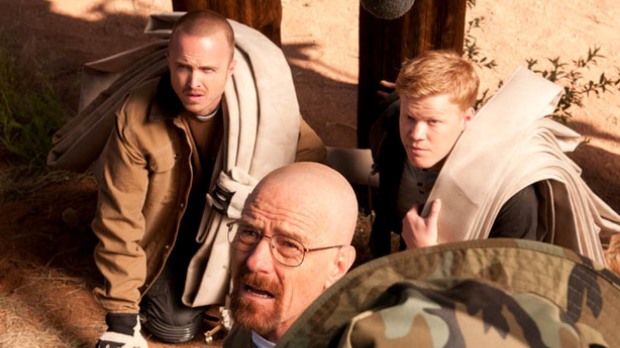
With each passing year, it seems more and more archaic to refer to television’s current landscape as a ‘Golden Age.’ How long exactly can a ‘Golden Age’ last before we start to consider it a permanent phenomenon?
For a decade and a half now, we’ve seen a steady stream of pioneering shows that have changed the mainstream standard for quality television. Yes, many of these shows exist on the fringes of TV – are supremely low-rated or in constant threat of cancellation. And yes, the medium is still undoubtedly in a state of flux, as everyone scrambles to figure out exactly how audiences will enjoy television ten years from now. But the fact that there is no shortage of daring, innovative, auteur-driven content being produced on the small screen is becoming old news.
These ten shows – the best I watched in 2012 – illustrate that if this can indeed still be called a ‘Golden Age’ of television, it shows no signs of drawing to a close anytime soon.
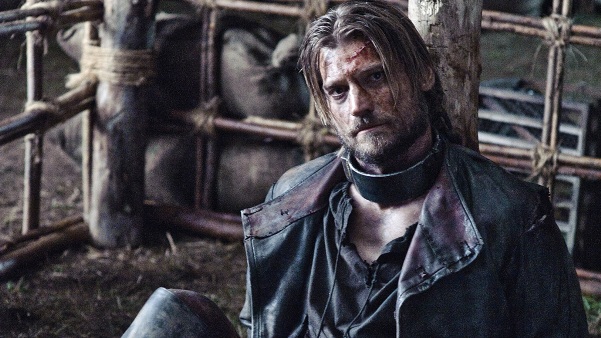
10. Game of Thrones
The consensus on season two of Game of Thrones is that the show was the victim of a slight sophomore slump. And while there’s some truth to this assessment, Thrones still managed quite an impressive feat in 2012 – it consistently improved upon its source material in nearly every way possible. Because, truth be told, the second installment in George R. R. Martin’s fantasy series is kind of a mess – a sprawling epic, yes, with flashes of coolness throughout (evil killer smoke baby, anyone?), but lacking the connective tissue necessary to make it anything more than a piece-mover between books one and three.
Watching the HBO show’s second season, it felt as if creators David Benioff and D. B. Weiss were aware of this going in. Every plotline not from the original novel, but created specifically for the series – from Arya’s stewardship under Tywin Lannister, to Jaime Lannister’s increased role, to Danaerys’ entire plotline – was seamlessly integrated into the narrative, and oftentimes proved more compelling than those moments that were pulled directly from the book. Whereas the first season of Game of Thrones was an impressively faithful adaptation of a wonderful novel, in season two the show began to establish a voice all its own.
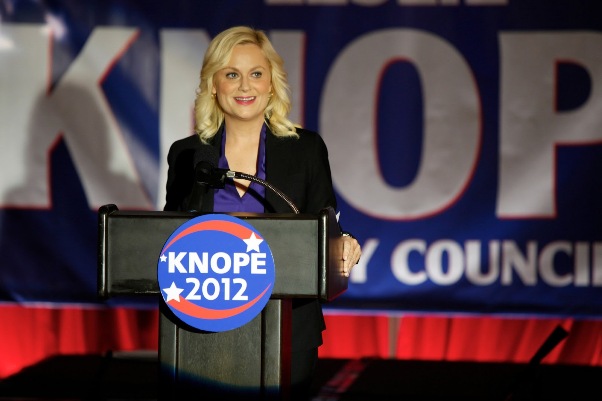
9. Parks and Recreation
Parks and Recreation is coasting confidently into middle age. The show has always been an underdog – its narrow escape of cancellation at the hands of NBC execs has become something of an annual tradition. But with each passing year, Parks and Recreation feels more and more the dependable staple of NBC’s Thursday night comedy lineup.
At this point, Parks many virtues are well-established – its stellar ensemble, the hilariously town of Pawnee, Indiana (a close third behind Springfield and Twin Peaks on the list of all-time craziest TV towns), and moments of emotional sincerity that feel both shamelessly earnest and completely earned. In the season four finale, the show reached one of those emotional peaks with the bittersweet election of Leslie Knope (Amy Poehler) to the Pawnee City Council, a moment that paid off a season’s worth of build-up. Let’s hope that NBC will allow viewers to relish in that victory, these characters, and this town for many more years to come.
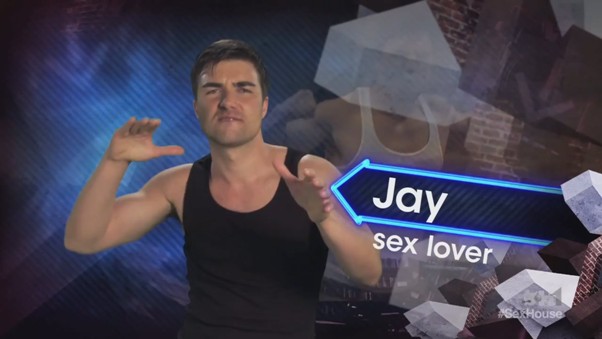
8. Sex House
By this time next year, TV on the internet will be an entirely different beast. With Netflix pouring hundreds of millions into original programming (the Kevin Spacey-starring House of Cards launches this February), the days of mainstream internet entertainment never stretching beyond bite-sized memes and short viral videos are numbered. So it’s fitting that this shift began on a micro-scale this year with Sex House, a deceptively sharp satire from The Onion that is almost assuredly the most adventurous comedy series that the World Wide Web has yet to produce.
While Sex House began as a funny but unremarkable lampooning of reality television and the fame-thirsty caricatures that gravitate towards that medium, the show deliberately morphed over its ten-episode lifespan into an absurdly dark indictment of the role we all play in America’s culture of entertainment. In the end, this was not a series created to get a few good jabs in at Snookie, it was a series about our ravenous desire to fit our public figures into simple roles, and about the nasty voyeurism built into that impulse. Here’s hoping that the oncoming wave of bigger-budget internet TV fare endeavors towards such lofty aspirations.
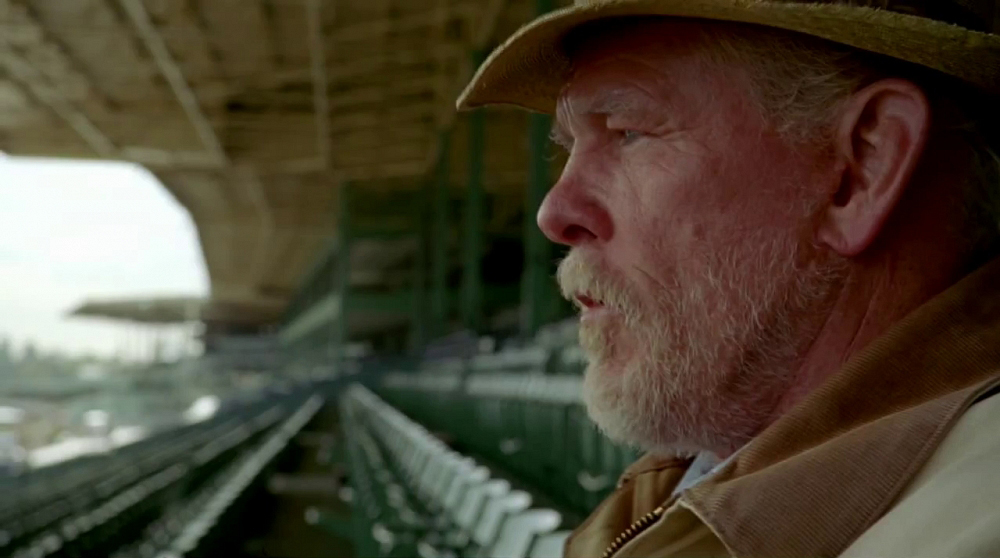
7. Luck
Just as Al Swearengen, creator David Milch’s most memorable creation, used to grumble, “history is a lie agreed upon.” And unfortunately, the history of Milch’s short-lived HBO drama Luck seems to be already written. It goes like this – Luck got off to an uneven start, with plotlines and characters that never quite cohered into a compelling whole, due in part to Milch and co-creator Michael Mann’s publicly rocky collaborative relationship. And just as quickly as it arrived, the series was gone, cancelled due to several tragic horse deaths during production.
But what this summation fails to bring into focus is the wonderful cast of characters that Milch used to bring his racetrack to life – four middle-aged gamblers, each with his own set of crippling limitations and endearing quirks, Richard Kind’s stuttering, suicidal jockey agent, Dustin Hoffman and Dennis Farina’s unexpectedly gentle tough guys, and many others. This is what has always made Milch stand out amongst his many talented HBO peers – an unwavering empathy for his creations, be they misfits, crooks, or criminals, and an unending hunger to earn life affirming moments between them. Let the record show, Luck provided such moments in spades.
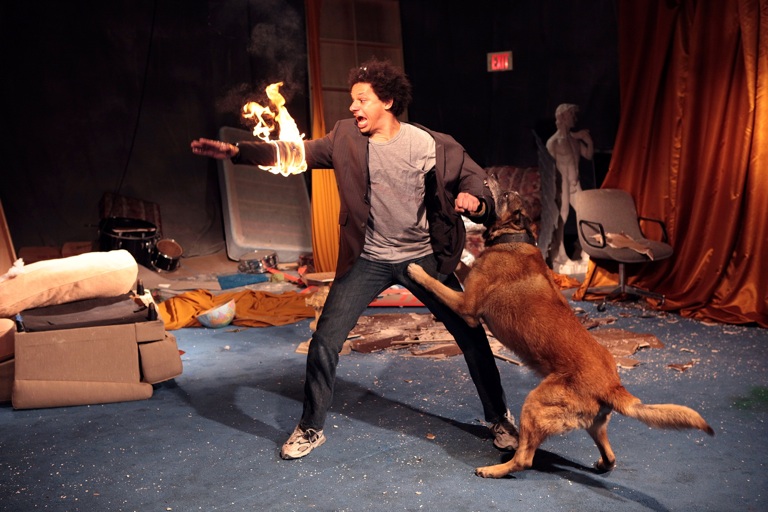
6. The Eric Andre Show
Many works of popular culture, from Scorcese’s The King of Comedy to Louie’s recent three-part, David Lynch-guesting arc about The Late Show, have lampooned the absurdities of the late night TV format. But never has the sub-genre’s underlying weirdness been so carnivorously ripped to shreds as in The Eric Andre Show. Like many of his Adult Swim peers – especially aesthetic forefathers Tim Heidecker and Eric Wareheim – Andre manages to cram a lifetime’s worth of insanity into every 11-minute offering.
Over ten episodes (and one just aired, brilliant “New Years Eve Spooktacular”), the show raced through a kitchen sink’s worth of celebrity interviews both real and faked (one featuring a dazed Jack Nicholson lookalike exposing his nipples and rambling about crimes he’s committed), frequent fourth wall breaks, surreal on-the-street gags, and at least a dozen broken desks. And no summation of the show’s many joys would be complete without a mention of Hannibal Buress as Andre’s perpetually stoned sidekick, who manages to serve simultaneously as the show’s sole straight-man and most hilarious addition.

5. Breaking Bad
It’s not hard to understand why AMC cut Breaking Bad’s fifth and final season in two part, electing to air the first half this past summer and the concluding episodes sometime in 2013. With each passing year, the cult of Breaking Bad seems to at least double. Like The Wire before it, the series has oscillated away from the category of ‘brilliant and underrated’ towards, ‘universally lauded, to the point where even your parents are catching on.’
That’s because the series has redefined the art of the slow build, never taking narrative shortcuts in its portrayal of Walter White’s slow, awful moral rot. For instance, note that in the show’s early years, Mr. White and his partner in crime Jesse Pinkman (Aaron Paul) spent an entire episode simply trying to figure out how to properly dispose of a dead body. Now, in season 5, the duo manage to deal with the fallout from the brutal, accidental murder of a 10-year old child in a matter of minutes.
Over the past five years, Vince Gilligan and his team have built a perfectly-developed universe, one of escalating tension, lies, and horror; a universe which, if season 5’s final moments are any indication, is just waiting to topple over.
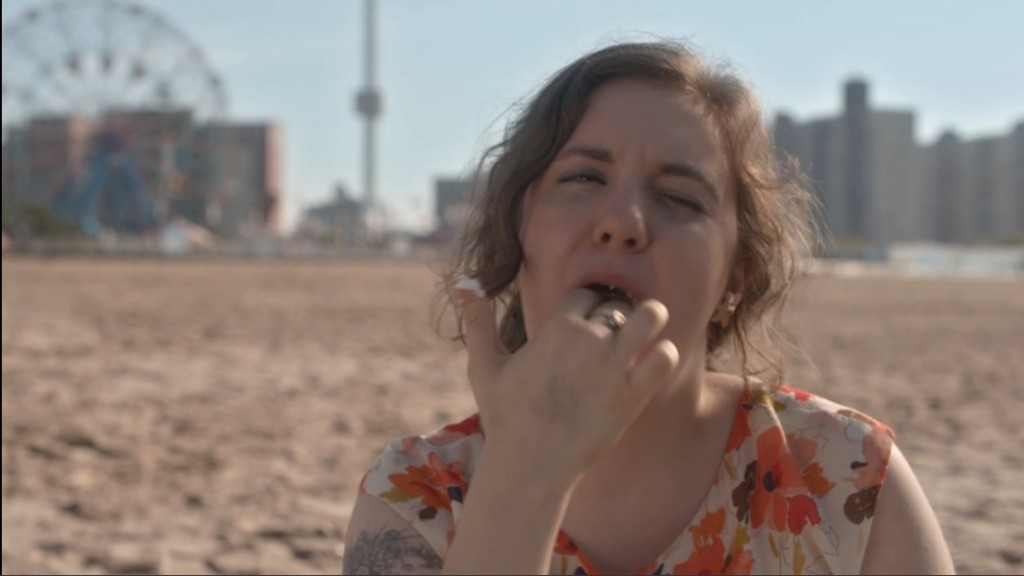
4. Girls
There’s no doubt in my mind that Lena Dunham’s Girls was, by a wide margin, the best new show of 2012. A meteoric improvement over 2010’s Tiny Furniture, Girls found Dunham coming into her own as a brilliant satirist, a great actress, and a viciously scrutinized public figure.
Over ten episodes, the HBO sitcom improved more than most shows do in their entire runs. And that’s because, like Hannah, the character she plays, Dunham is not afraid to experiment, whether that means humanizing a character that first appeared to be a one-note sociopath (Hannah’s sometimes-boyfriend, sometimes-fuck-buddy, played by Adam Driver) or leaving the show’s NYC-setting for a contemplative episode set in Hannah’s suburban hometown.
In that episode, Hannah’s parents go out to dinner together, and discuss their fears about their daughter’s future, worrying that she doesn’t know what she’s doing with her life. “She knows how to have fun,” Hannah’s mother (Becky Ann Baker) remarks. “…And then she thinks about that fun. And she learns from that fun.” Throughout its first season, Girls displayed a similar virtue.
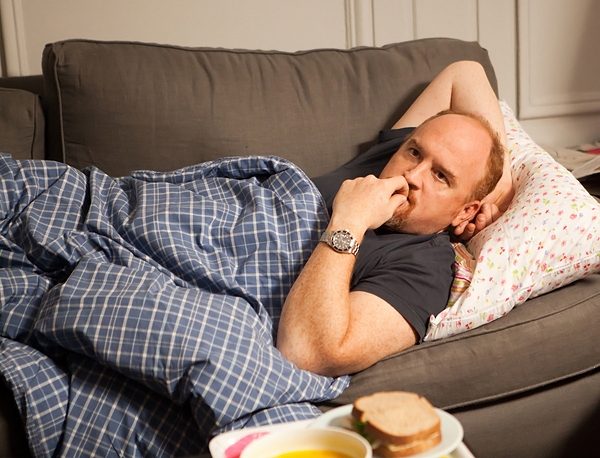
3. Louie
Last year, Louie cemented its place as TV’s most ingenious comedy, brilliantly imploding the sitcom format to the point where you had no idea tuning in each week if you were going to be watching a surreal black-and-white short film, an incredibly depressing relationship drama, or an extended fart joke (or all three, back to back to back). That same stylistic grab bag carried into Louie’s third season, but creator Louis CK brought along a new bag of tricks to keep things ever surprising.
Most notable this year – the series’ gradual embrace of a more serialized narrative format, something previous seasons consciously rebelled against. Throughout the show’s latest run, injustices and humiliations piled up in CK’s life – an eventful first date with manic-depressive guest star Parker Posey, a multi-episode run to succeed David Letterman on The Late Show, and a handful of debilitating missed connections with subjects as diverse as a hunky Latino lifeguard and the looming presence of CK’s never-seen dad. And then, in the show’s sublime season finale, each thread was beautifully paid off, sometimes subtly, sometimes in the most absurd ways possible.
Louie has always been much more than the sum of its parts. This year the show found a new way to prove it.
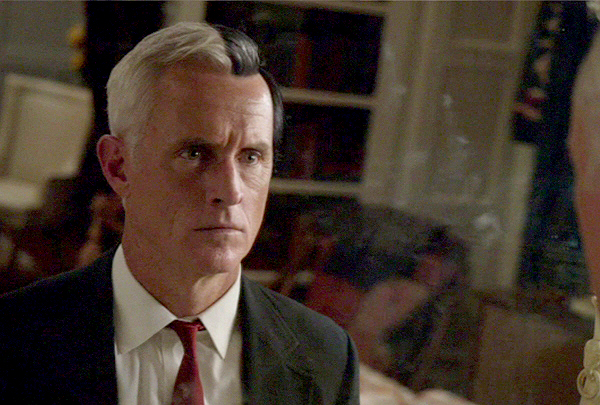
2. Mad Men
I’ve always felt that The Sopranos didn’t reach its full power until the final few seasons. With age, the show grew richer, more confidant, and somehow more itself. The more people talked about The Sopranos as The Great American TV Show, the more it started to live up to that title.
Season five of Mad Men – ironically the first not to win the Emmy for Best Drama – reminds of this phenomenon. Coming off an extended hiatus, Mad Men returned to AMC for its strongest year to date. Set in 1966 – over halfway through the decade that the ad men of Sterling, Cooper, Draper, Pryce are struggling to maintain their roles within – the show took on a decidedly darker tone. Two late season episodes in particular – one which found fan favorite Joan (Christina Hendricks) confronted with a horrifying dilemma, and the other which featured the most telegraphed death in TV history – provided wrist-cuttingly rich drama.
But throughout the season, the show displayed a cinematic flare and storytelling prowess more daring than anything it had previously attempted (two quick examples, so memorable they need to be mentioned – Roger’s surreal LSD trip in ‘Far Away Places’ and Don’s long, lonely listen to ‘Tomorrow Never Knows’ in ‘Lady Lazurus’).
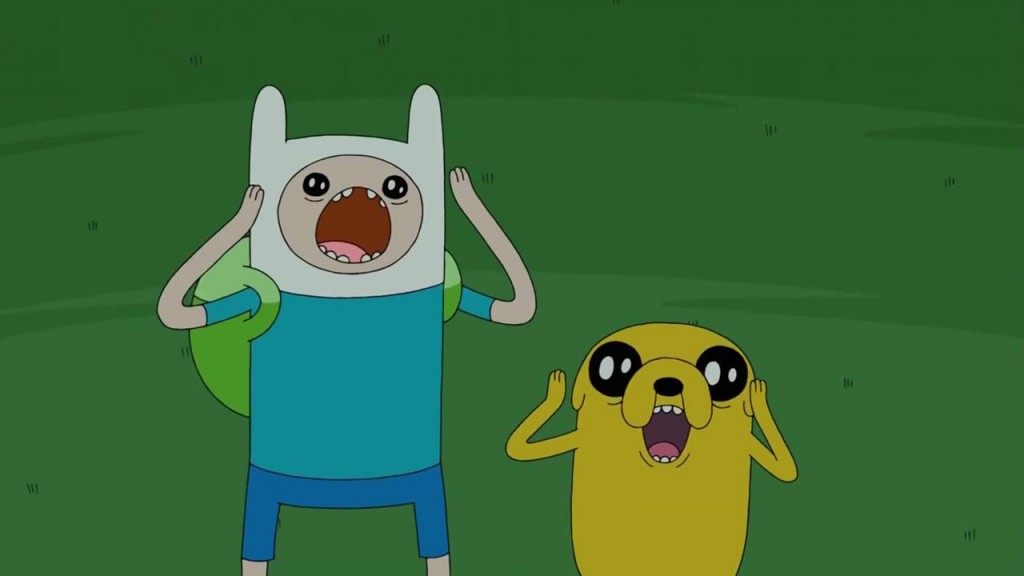
1. Adventure Time
Yes, a children’s cartoon about a human boy and his talking dog is the best show on TV. I’ll try to explain.
Adventure Time has been on the air essentially nonstop since its Cartoon Network premiere in 2010 (though technically, season five began a few weeks ago). On paper, the show might sound indistinguishable from any other kid’s show – each week we follow the ramshackle adventures of Finn the Human and Jake the Dog, two best buds who travel the magical Land of Ooo, a storybook world populated by characters like Princess Bubblegum, The Ice King, Marceline the Vampire Queen, and Cinnamon Bun (who is, you guessed it, a talking cinnamon bun). Stylistically, though, the show is like nothing you’ve ever seen before – a caffeinated mixtape of post-Sega Genesis anime, autotune soundtrack, the visuals of Milton Bradley’s Candy Land as re-imagined by David Lynch, and a big, huge, weird, pubescent heart.
I could go on and on about “I Remember You”, the best 11-minutes of television I saw this year – a devastating parable about coping with an aging loved one’s dementia. Or “Sons of Mars,” a trippy epic that posits Abraham Lincoln as a Christ-like deity, and ends with a tiny lion-unicorn hybrid being freed from a glass bottle and flying off into the sky screaming, “My new prison is shame!” Or the fact that repeat viewers will come to realize that the magical Land of Ooo is actually a future version of Earth, ravaged from nuclear war. Or the terrifying “King Worm.” Or the thinly-veiled masturbation metaphor of “All the Little People.” Or lines of dialogue that I haven’t been able to shake from my head since I first heard them (“This bear is tops blooby,” “In the tree, part of the tree,” “I don’t know if my little boy heart can take it.”)
But this is all stuff better experienced that explained, I promise. I don’t care how old you are, Adventure Time will make you remember what an awesome, terrifying sugar-rush it is to be young.
